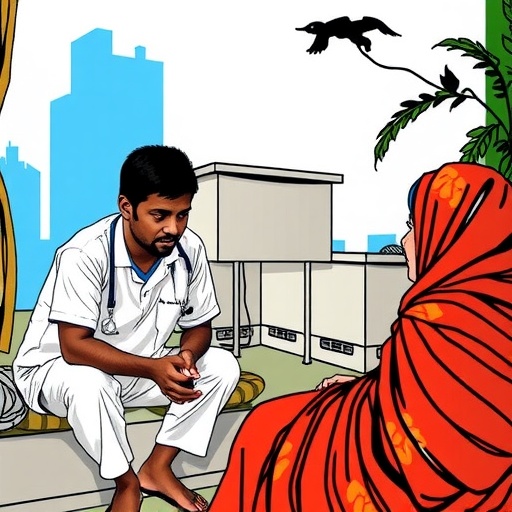Malaysian politician under fire for comparing women to cows – South China Morning Post

Incident of Misogynistic Rhetoric in Malaysian Politics and its Implications for Sustainable Development Goals
1.0 Incident Overview
A local official from Malaysia’s Islamist PAS party, Muhammad Salman Al Farisi, has been widely condemned for a social media post that used a derogatory animal metaphor to criticize female leadership. The incident highlights significant challenges to the nation’s progress on key Sustainable Development Goals (SDGs).
- Subject: Muhammad Salman Al Farisi, youth information chief for PAS’ Maran branch.
- Action: Published a social media post likening women leaders to “female” cows who lead a herd while the males “only know how to graze.”
- Statement: The official explicitly advised against elevating women to leadership positions, stating, “we shouldn’t be like cows that elevate their ‘female’ as their leader.”
- Response: The remarks were immediately met with widespread public and political condemnation, described as “demeaning” and “outdated.”
2.0 Analysis in the Context of Sustainable Development Goals (SDGs)
The politician’s comments represent a direct contradiction to the principles enshrined in several SDGs, undermining efforts to build an inclusive and equitable society.
-
SDG 5: Gender Equality
The incident is a profound setback for the achievement of SDG 5, which aims to achieve gender equality and empower all women and girls.
- Violation of Target 5.5: The rhetoric directly opposes Target 5.5, which calls for ensuring women’s full and effective participation and equal opportunities for leadership in political, economic, and public life.
- Perpetuation of Harmful Stereotypes: The comments reinforce discriminatory stereotypes that create significant barriers for women aspiring to leadership roles, thereby hindering progress on gender equality.
-
SDG 10: Reduced Inequalities
The statement contributes to the perpetuation of inequality, directly conflicting with the objectives of SDG 10.
- Contradiction of Target 10.2: The call to exclude women from leadership roles violates the core principle of Target 10.2, which is to empower and promote the social and political inclusion of all, irrespective of sex.
- Exposing Systemic Barriers: This event exposes the deep-rooted misogynistic attitudes that fuel systemic inequality within political structures.
-
SDG 16: Peace, Justice and Strong Institutions
The use of such language by a political official raises serious concerns about the integrity and inclusivity of public institutions, a key focus of SDG 16.
- Undermining Institutional Accountability: The incident reflects a failure within a political party to uphold principles of non-discrimination, challenging the goal of building effective, accountable, and inclusive institutions at all levels (Target 16.7).
- Erosion of Public Trust: Such rhetoric can erode public trust in political institutions, suggesting they are not representative of or safe for all segments of the population.
3.0 Conclusion
The condemnation of the politician’s remarks indicates a societal rejection of such discriminatory views. However, the incident itself serves as a critical reminder of the persistent cultural and political barriers that obstruct Malaysia’s path toward achieving its commitments under the 2030 Agenda for Sustainable Development. Addressing these challenges requires a concerted effort to promote gender equality, reduce systemic inequalities, and strengthen the inclusivity of all public institutions.
1. Which SDGs are addressed or connected to the issues highlighted in the article?
SDG 5: Gender Equality
- The article directly addresses gender equality by highlighting a case of “deep-rooted misogyny” within Malaysian politics. The politician’s comments, which liken women leaders to cows and suggest they are unfit for leadership, are a clear example of gender-based discrimination and prejudice.
SDG 10: Reduced Inequalities
- The issue connects to reducing inequalities, as the politician’s statement promotes inequality between genders in the political sphere. By attempting to discredit female leadership, such rhetoric works against the social and political inclusion of women, reinforcing discriminatory attitudes that create barriers to equal opportunity.
SDG 16: Peace, Justice and Strong Institutions
- The article touches upon the quality and inclusivity of public institutions. The expression of misogynistic views by a political official (“a local official from the Islamist PAS party”) undermines the goal of building effective, accountable, and inclusive institutions at all levels. Such attitudes are a barrier to creating a political environment that is representative of the entire population.
2. What specific targets under those SDGs can be identified based on the article’s content?
SDG 5: Gender Equality
- Target 5.5: Ensure women’s full and effective participation and equal opportunities for leadership at all levels of decision-making in political, economic and public life. The politician’s post directly attacks this target by stating, “we shouldn’t be like cows that elevate their ‘female’ as their leader,” which explicitly discourages the appointment of women to leadership positions in politics.
- Target 5.1: End all forms of discrimination against all women and girls everywhere. The politician’s remarks, described as “demeaning” and “outdated,” constitute a form of verbal discrimination and perpetuate harmful stereotypes against women, which this target aims to eliminate.
SDG 10: Reduced Inequalities
- Target 10.2: By 2030, empower and promote the social, economic and political inclusion of all, irrespective of age, sex, disability, race, ethnicity, origin, religion or economic or other status. The article highlights a statement that actively seeks to undermine the political inclusion of women, which is in direct opposition to this target.
- Target 10.3: Ensure equal opportunity and reduce inequalities of outcome, including by eliminating discriminatory laws, policies and practices. The “deep-rooted misogyny” mentioned in the article represents a discriminatory practice and attitude within politics that creates inequality of outcome for women seeking leadership roles.
SDG 16: Peace, Justice and Strong Institutions
- Target 16.7: Ensure responsive, inclusive, participatory and representative decision-making at all levels. The politician’s view is fundamentally against the principle of inclusive and representative decision-making, as it questions the capability of an entire gender group to participate effectively in leadership.
3. Are there any indicators mentioned or implied in the article that can be used to measure progress towards the identified targets?
Indicators for SDG 5
- Implied Indicator for Target 5.5: While the article does not provide statistics, the entire controversy is about the presence and role of women in leadership. The politician’s comment, “When a female cow is appointed as the leader, she decides everything,” implies that women are already in or are being considered for leadership roles. The public and political debate surrounding this issue is an indirect measure of the ongoing struggle for, and societal attention to, women’s political participation (related to official indicator 5.5.1: Proportion of seats held by women in local governments).
- Implied Indicator for Target 5.1: The existence of “demeaning” public statements by political figures and the description of misogyny as “deep-rooted” serve as qualitative indicators of the prevalence of discriminatory attitudes and practices against women that still need to be addressed.
Indicators for SDG 10
- Implied Indicator for Target 10.2/10.3: The reaction to the politician’s post, which “drew a chorus of condemnation” from “the public on social media” and from “within his own opposition coalition,” can be seen as an informal indicator. It measures the level of public and institutional rejection of discriminatory and exclusionary rhetoric, suggesting a societal desire for greater inclusion and equality.
Indicators for SDG 16
- Implied Indicator for Target 16.7: The article highlights a barrier to achieving inclusive institutions. The public condemnation of the official’s non-inclusive stance serves as an indicator of public demand for more “responsive, inclusive, participatory and representative” political bodies.
4. Create a table with three columns titled ‘SDGs, Targets and Indicators” to present the findings from analyzing the article.
| SDGs | Targets | Indicators |
|---|---|---|
| SDG 5: Gender Equality |
|
|
| SDG 10: Reduced Inequalities |
|
|
| SDG 16: Peace, Justice and Strong Institutions |
|
|
Source: scmp.com

What is Your Reaction?
 Like
0
Like
0
 Dislike
0
Dislike
0
 Love
0
Love
0
 Funny
0
Funny
0
 Angry
0
Angry
0
 Sad
0
Sad
0
 Wow
0
Wow
0


-1920w.png?#)






































































